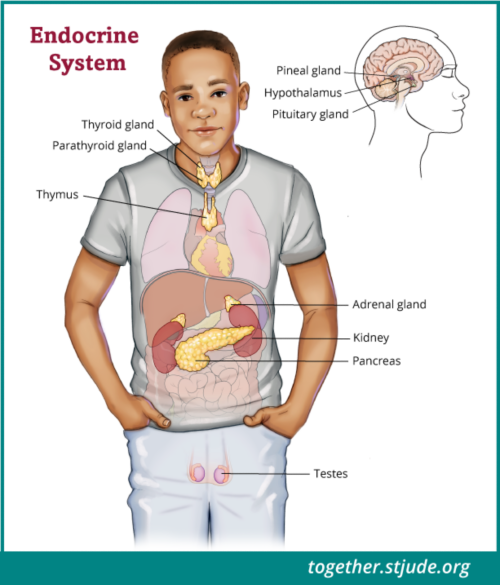Some childhood cancer treatments may cause problems in the endocrine system.
Precocious puberty is one endocrine condition caused by childhood cancer treatment.
Precocious puberty means having signs of puberty at a younger than expected age (8 years in girls, 9 years in boys).
Learn More About the Endocrine System
What is puberty?
Puberty is the time of life when a child experiences physical and hormonal changes that mark the transition into adulthood. These changes result from the production of sex hormones and the maturing of the reproductive organs — testes in males and ovaries in females.
Changes include:
- Developing pubic and armpit hair
- Facial hair growth in males
- Breasts in females
- Being able to have children
Puberty normally begins between the ages of 8-13 in girls and ages 9-14 in boys. A person’s genetic background influences when puberty begins. The onset of puberty at a young age may run in families.
Most girls begin puberty by developing breast buds and then pubic hair by age 10 or 11. Menstrual periods usually start around 12 or 13.
Boys typically begin puberty with increase in size of the testes and then pubic hair by age 11 or 12.
Precocious puberty signs and symptoms
Most doctors agree precocious puberty has occurred in girls if sexual traits develop before age 8 and in boys if sexual traits appear before age 9.
Precocious puberty is not only an early form of puberty, it is also a type of puberty that advances very quickly. It may shorten the period of time during which growth is possible. Children with precocious puberty who do not get treated may have a final adult height that is much shorter than normal.
Causes of precocious puberty
Damage to the hypothalamus and pituitary gland can cause precocious puberty. This condition happens when these glands signal the ovaries and testes to make sex hormones at an earlier than normal time.
In other cases, abnormalities in the ovaries, testes, or adrenal glands may trigger early signs of puberty.
Tests can confirm whether the cause of precocious puberty is in the brain (precocious puberty) or because of a problem in the ovaries, testes, or other organs.
What survivors can do
Know your risks and monitor your health
Ask your oncologist about your risks of developing late effects.
Inform your primary health care provider about your risks. Share a copy of your Survivorship Care Plan, which includes a treatment summary. The summary includes details about your cancer treatment and information about health problems that may occur because of your treatment.
All childhood cancer survivors should have a physical examination at least once a year. The yearly check-up should include:
- Measurement of height and weight
- Evaluation of puberty progress in preteens and teens
- If there are signs of accelerated growth or early puberty, the provider may do a blood test to check sex hormones produced in the brain.
- Sometimes, the provider may order an X-ray that measures the skeletal “bone age.”
Treatment
If a problem is detected, the provider may refer the survivor to an endocrinologist. The provider may prescribe medications to temporarily stop puberty to allow more time for growth.
It is also important to evaluate and manage the psychological effects of starting puberty too early. Although children with precocious puberty may have a mature physical appearance, their thoughts, emotions, and behaviors are still that of their actual age.

